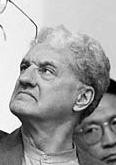Walk this
way. A postcard from Jean Dierkes-Carlisle, penned in the
Caffé Trieste: "Sidewalk obstruction is a completely
unaddressed problem in North Beach, especially on Grant Avenue and
some stretches of Columbus, oversaturated with outdoor tables,
waiters, diners, skateboards, scooters, and worst of all, young
adults in clusters, oblivious to those of us who live in the
neighborhood and anyone trying to navigate the streets without
walking in the gutter. The homeless of North Beach do not obstruct
the sidewalks."
Block that metaphor. What
slippery stuff is the English language! Last week this space
contained a reference to "Our Mayor’s fine Italian hand in a
recent Planning Department proposal" about the Sunset. Having
spent several youthful years practicing the ancient art of
calligraphy, I had in mind a red-robed Venetian nobleman holding a
quill pen, penning an elegantly worded message that would destroy
his enemies without striking a single physical blow. Sound like the
style of someone close to home? But a phone call from a reader
raised another interpretation. Why, the voice asked, are the
Italians always singled out as the bad guys? We’re not all members
of the Mafia, you know.
Perhaps Paul Hofman, New York Times bureau chief
in Rome and longtime observer of things Italian, should serve as
arbiter: "The penmanship of Italian Renaissance scribes and
copyists before printing became generalized — their ‘fine
Italian hand’ — was admired throughout Europe; Western
handwriting as taught to first-graders today developed from
14th-century Florentine cursive, a pencraft for speedily copying
ancient manuscripts. The phrase 'fine Italian hand' has long meant
the particular way Italians like to do things, preferring adroitness
to sheer force. Although the expression originally was a tribute to
proverbial dexterity, ironical overtones suggesting manipulation and
craftiness can now be detected whenever the ‘fine Italian hand’
is mentioned." Mea culpa. Next time I’ll stick to "Machievellian."
Budgeting for peace. It’s
a matter of simple math, says Andy Sekara of San
Francisco Progressive Challenge (415 333-2736), a network that
brings scholars, researchers, and activists together to brief
policymakers. "The defense budget for the year 2001 is $310
billion dollars. This ‘Cold War’ budget is 20 times more than
all the nations considered a threat to our security — Libya, Iraq,
Iran, Cuba, and North Korea. If we could cut this defense budget by
35 percent (and this would not endanger the safety of our country),
it would deliver to us a peace dividend of about $108 billion
dollars." On September 23 more than 20 organizations intend to
put their mouths where their money is, convening a blue-ribbon
roster of speakers including Rear-Admiral Eugene J. Carroll, Jr. and
San Francisco’s own Calvin Welch to discuss issues of military and
peaceful spending. The occasion is a Congressional Forum on
Redefining National Security; the place is the Clark Kerr Campus in
Berkeley.
Fighting the political blahs. Each
day candidates manage to put new spins on worn-out practices. Are
you tired of the Republican/Democratic same-old same-old? asks
Starchild ( 415 626-3036), a Libertarian candidate for State
Assembly in the 13th District. Help to force open up the
debates by registering with a third party, he suggests. "Even
if the votes go to the Democrats and Republicans in the end,
reregistering will take away the guarantee of power and increase the
number of choices at debates and in the voting booth." And can’t
you imagine the looks on the pollsters’ faces when they try to
explain the new configuration? <><><> Marc
Salomon, candidate for supervisor in District 6, applies the
miracles of cybercraft to an age-old sure-fire winner. His website
contains a proposal — "Require lobbyists to wear red clown
noses when lobbying City officials" — and a familiar face to
practice on.
